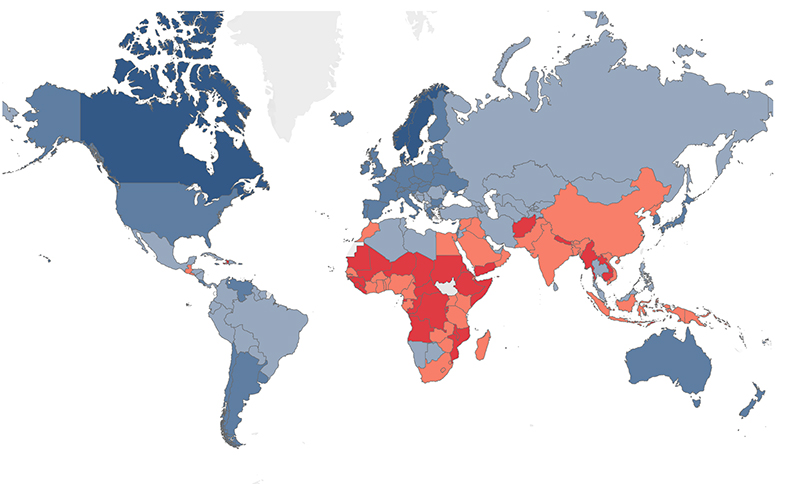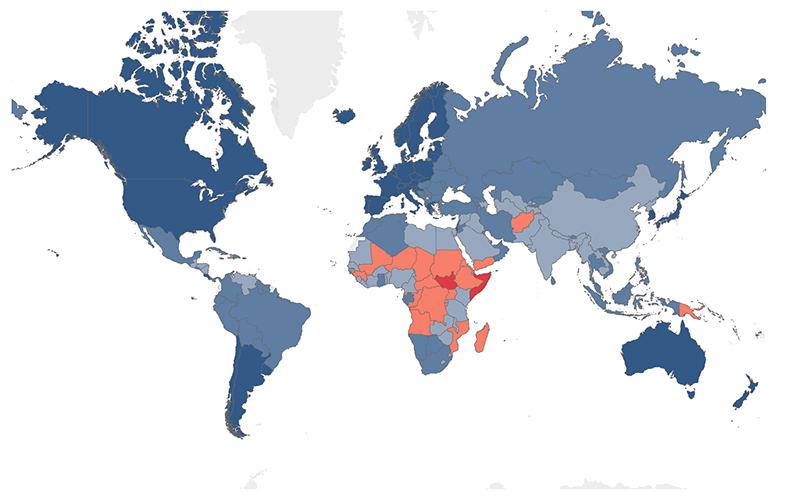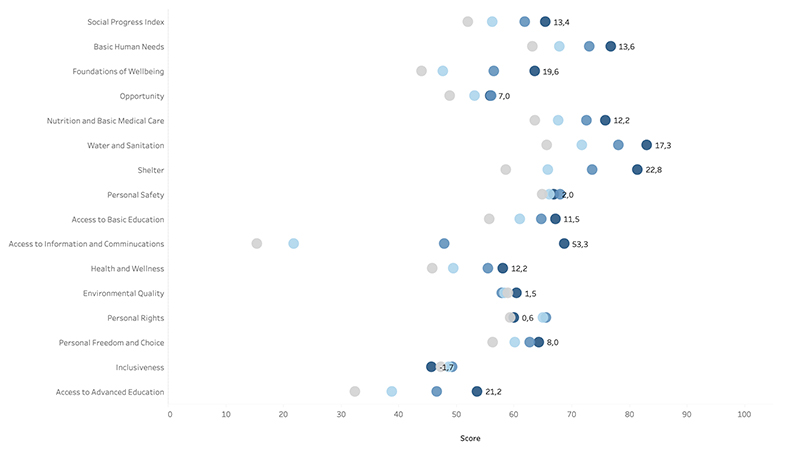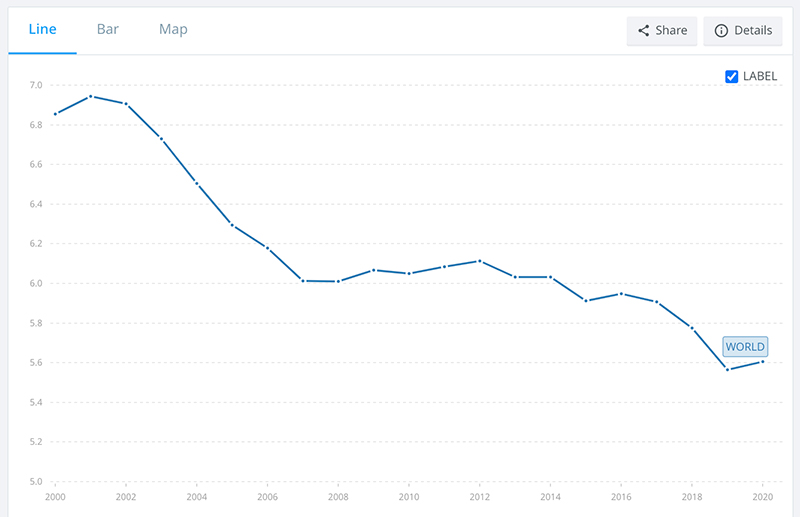Volcanoes are erupting in The Philippines, but on-fire Australia received some welcome rain. The Iran war cries have been called off and The Donald’s military powers are about to be hamstrung by the Senate. Meanwhile, his impeachment trial is starting, and we’re all on Twitter for a front-row seat.
What Could Go Right? Is the world a better place today?
A decent answer in several charts
This is our weekly newsletter, What Could Go Right? Sign up here to receive it in your inbox every Thursday at 6am ET. You can read past issues here.
Better or worse?
“Is the world getting better or worse?” is a popular question that is complicated to answer. “By what measure?” may be the best follow-up to it. There are large datasets, however, that address several measures at once, with data from most of the world’s countries. These are a handy tool for a decent answer to the question.
One of those datasets is the Social Progress Index (SPI), which measures 52 different quality of life indicators, broadly grouped into three baskets: basic human needs (food, water, shelter, medical care), foundations of wellbeing (education, life longevity, environment), and opportunity (personal freedoms and rights). They combine these indicators into one overall score. It does not track GDP, which measures economic output and is a common but inadequate method for assessing a country’s welfare.
Last week SPI released a new data set that includes the ability to compare countries year by year from 1990 to 2020. (2021 and 2022 weren’t included as they use a larger number of indicators.) So, when it comes to quality of life, is the world getting better or worse? On the index, 100 is a perfect score and is dark blue; 0 is dark red.
Here is the world in 1990:

And the world in 2020:

To put this another way, of the 170 countries measured, almost every single one had a higher SPI score in 2020 than they did in 1990—even already high scorers, like Switzerland and Norway, and even North Korea (although their score was not higher by much). Only Venezuela’s overall score declined; Tajikistan had the same score in 1990 and 2020; and in addition to North Korea, Nicaragua, Zimbabwe, and the Central African Republic showed very little progress. In contrast, other countries shot up the rankings during the last 30 years. Maldives’ score went from 46 to 74; South Africa 48 to 73; and Bhutan 41 to 70, for example.
Of course, if you “zoom in” on the data for each country, progress is not even across all the indicators. But again, for the world as a whole, everything has improved since 1990 except for the indicators of personal safety, personal rights, and inclusiveness, as the below chart shows. 1990 is grey and 2020 is dark blue.

You can dive into the data yourself if you want to see the indicators’ change in more granularity, or a specific country’s scores. Despite a solid 30 years, there are some clouds on the horizon. We covered SPI’s 2021 data in this newsletter but not 2022’s, which is here. That report notes that “given risks from climate change, economic turbulence, and political change, we see a significant risk that, for the first time, the world’s social progress will retreat in 2023.”
Quick hits
According to one poll, for the first time, a majority of Americans (62 percent) agree that the pandemic is over. Meanwhile, low and middle-income countries, on the average, have recovered to pre-pandemic levels of poverty.
A man who became paralyzed after he broke his neck in an accident has been able to stand and walk more than 100 meters with the help of a “walker on wheels” and a brain implant that communicates instructions to his spine.
Finland had an “unusual problem” last week: so much clean, hydroelectric energy that prices for electricity were in the negative. Those were market prices, not the ones customers pay, but still, from an everyday Finn’s perspective, energy is so abundant and cheap right now that they can leave the lights on as much as they want.
Below in the links section, bendy solar panels, air-powered electricity, sea-turtle rights, and more.
By the Numbers
A pop-up section in which we celebrate numbers that represent substantial improvement in people’s lives
.07: The number of homicides per 100,000 people in Bahrain, the country with the lowest intentional homicide rate in 2021
32: The number of countries that had an intentional homicide rate under one per 100,000 people in 2021
8: The ranking of Slovenia, the least murderous European country, followed by Ireland at #10
Source: The World Bank
(For those curious, the United States is #75 at 6.80 homicides per 100,000 people, sandwiched in the list between Russia and Paraguay.)

What We Talk About When We Talk About Science | S4 E16

What’s the nature of the universe? What is life? And what do we talk about when we talk about science? We’re joined by Professor Sara Walker, an astrobiologist and theoretical physicist with research interests in the origins of life, artificial life, and detection of life on other worlds, to see how the way we think about the world informs the rest of our being. Plus, Indonesia’s growing economy, US job satisfaction, and an update on mapping the human genome. | Listen to the episode
Progress, Please
(Found good news? Tweet at us @progressntwrk or email.)
Other good stuff in the news 🍫
Energy & Environment:
- A new battery intended to power passenger airplanes and EVs, explained | Inside Climate News
- Scientists discover 380 new species in Southeast Asia | Nice News
- Bendy solar panels are just as good as regular ones | New Scientist
- Everything you need to know about the wild world of alternative jet fuels | MIT Technology Review
- India’s rural hospitals and clinics find reliable power in rooftop solar | AP
- Mars bar wrappers changed to paper from plastic in UK trial | The Guardian
- Renewables deliver record-low fossil power in Brazil in February | Ember
- Wind industry aims to provide a third of Japan’s power by 2050 | Reuters
Public Health:
- Groundbreaking Israeli cancer treatment has 90% success rate | The Jerusalem Post
- New Orleans aims to wipe out millions in medical debt | Axios
- Dengue cases fall to 20-year low in region where scientists release ‘virus-blocking’ mosquitoes | The Telegraph
- New kind of chicken lays eggs that don’t have allergy protein | Freethink
Science & Tech:
- Scientists working to generate electricity from thin air make breakthrough | Vice News
- Gene therapy in the womb is inching closer to reality | Wired
- New superbug-killing antibiotic discovered using AI | BBC
- Some cars can detect emergency vehicles before drivers do | Axios
- This is what food made from air, water, and electricity looks like | Bloomberg
- China sends first civilian astronaut to space | CNN
Politics & Policy:
- Texas House votes to repeal sales tax on menstrual products and diapers | The Texas Tribune
- Romania must recognize same-sex civil unions, EU top rights court rules | France 24
- 3 ways Minnesota is crushing it on climate action | Canary Media
- In Panama, legal rights given to sea turtles, boosting the ‘rights of nature’ movement | AP
Society & Culture:
- Should some criminal records be wiped clean after 7 years? | The New York Times
- Two San Diego collectors surrendered 65 archaeological objects to Mexico | ARTnews
- Greece will recover 351 looted antiquities after 17-year legal battle | ARTnews
- There is far more support for women’s rights than you think, study shows | Nadja News
Economy:
- More US women are working than ever, reversing pandemic slump | Bloomberg
TPN Member originals 🧠
(Who are our Members? Get to know them.)
- 17 thoughts on the debt ceiling deal | Matthew Yglesias
- In defense of crying | Robert Wright
- The Supreme Court’s Section 230 decision | Isaac Saul
- Is Assad here to stay? | Faisal Saeed Al Mutar
- How’s the US economy doing right now? | Ian Bremmer
- Analyzing AGI: What would the world of artificial general intelligence look like? | James Pethokoukis
- Think about your death and live better | Arthur C. Brooks
- Geopolitics, US foreign policy, and NATO enlargement—with Jeffrey Sachs | Scott Galloway
- Memorial Day—for all Americans | Theodore R. Johnson
- Jason Furman on the future of the world economy | Yascha Mounk
- Your most ambivalent relationships are the most toxic | Adam Grant
- World Bank’s David Malpass on global debt and economic inequality | Ian Bremmer
- Why AI will make our children more lonely | Scott Galloway
Department of Ideas 💡
(A staff recommendation guaranteed to give your brain some food for thought.)
“Misinformation” isn’t just on the right | Slow Boring
Progressives, conservatives, and moderates alike all believe things that aren’t true.
Why we picked it: Those in glass houses should not throw stones, and those who fall prey to misinformation should not point fingers. The fact that we are all prone to bias-confirmation and groupthink, writes Matt Yglesias, “is a kind of tragic aspect of the human condition and not a specific failure of your political enemies.” —Emma Varvaloucas
Until Next Time
Learn from this 6-year-old how (and why) to make room in your mornings for quiet time. 🤫 📖


